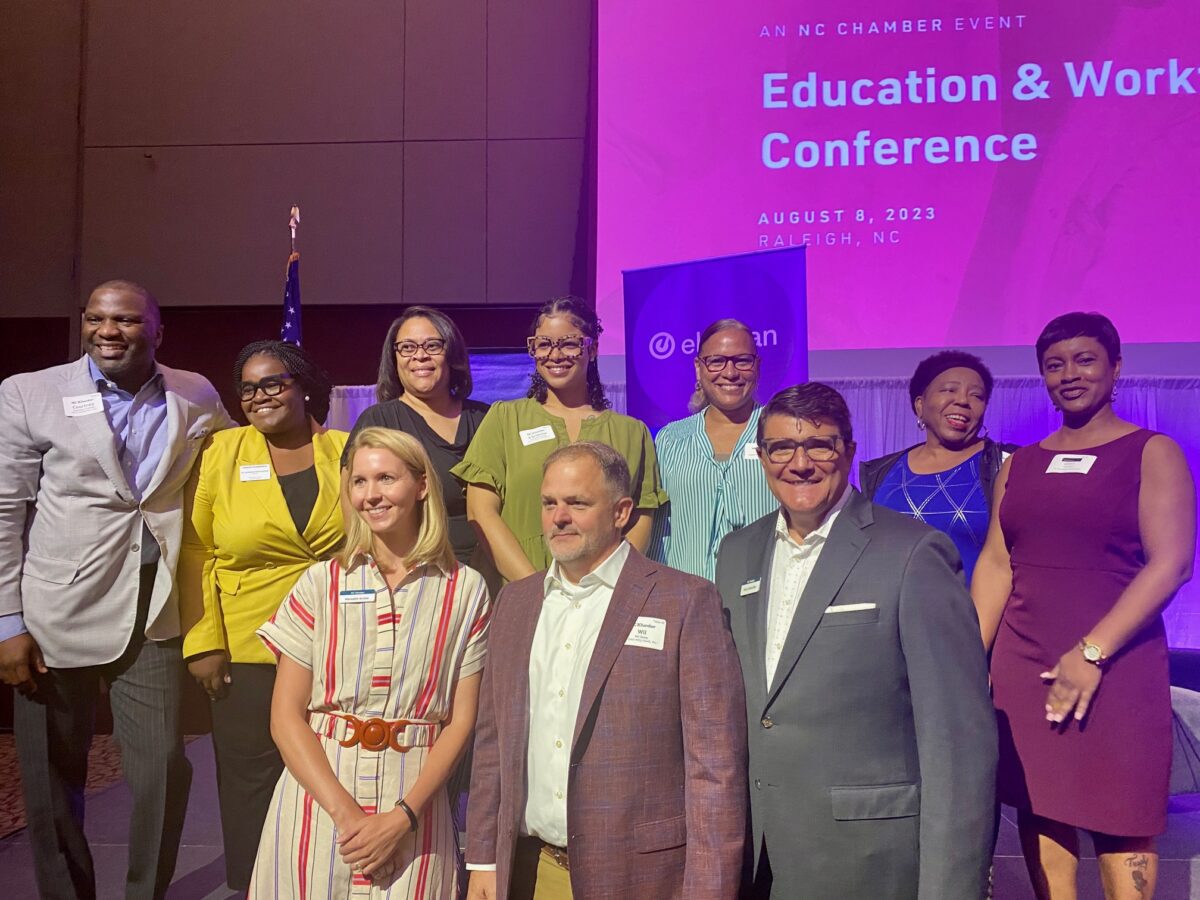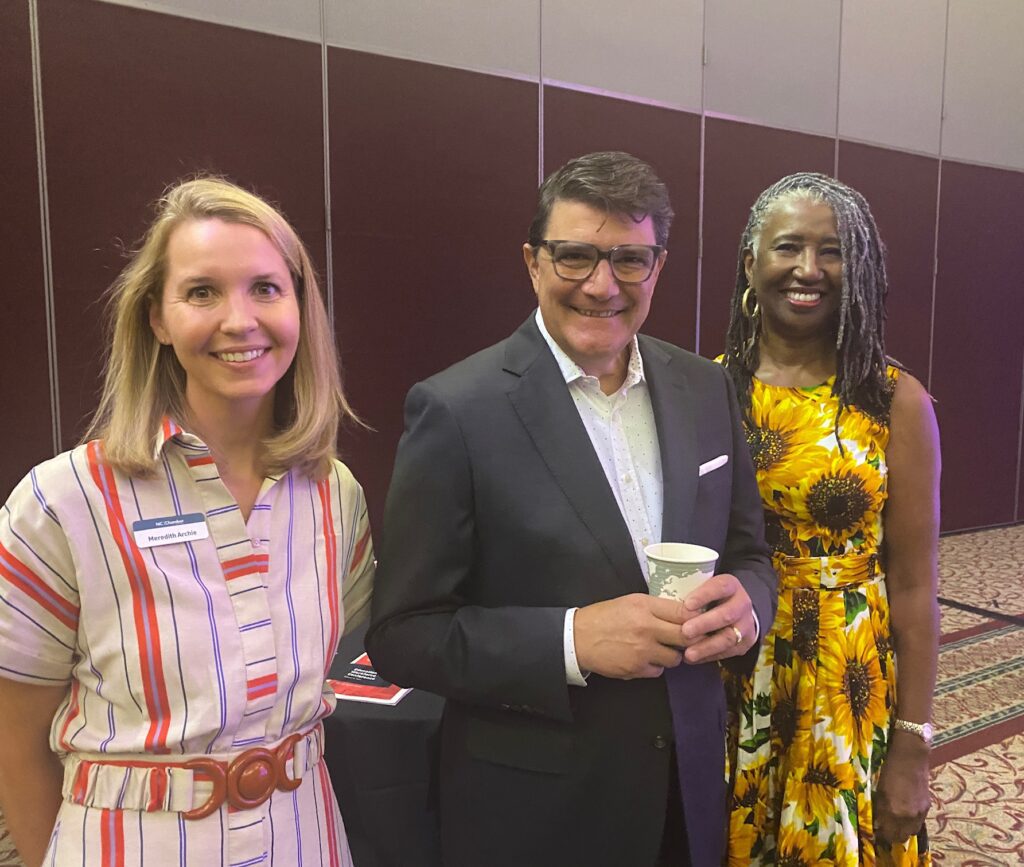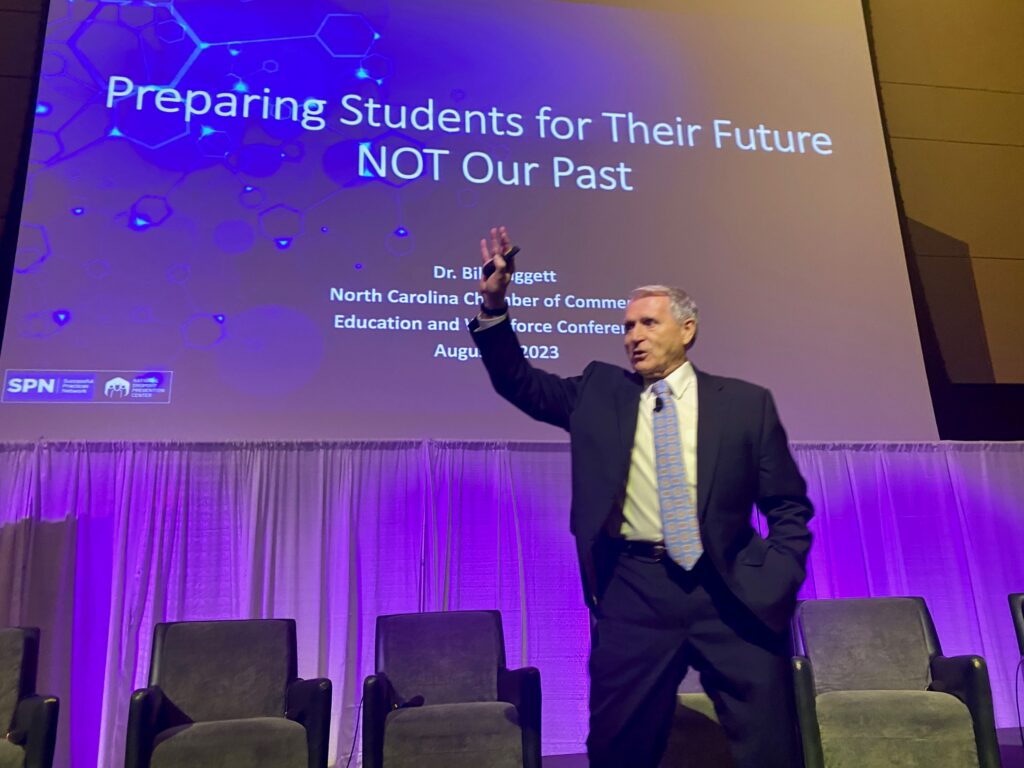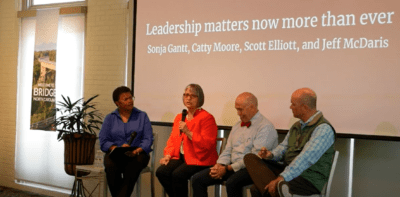
Share this story
|
|
How do we collectively define success?
Yesterday, the NC Chamber held its annual education and workforce conference looking at “the age of transformation” at hand as the world emerges from the pandemic.
Gary Salamido, president and CEO of the Chamber, closed the convening of nearly 400 stakeholders by providing his definition of success.
“At the end of the day, it’s about culture,” Salamido said. “Are we being collaboratively a carrier of a culture that gives our citizens wherever they are in their life the best opportunity to succeed and live, work, and raise their family and have success? And are we really building communities, giving communities the resources at every dimension that they need to be healthy?”
From how access to Wi-Fi fits into Maslow’s hierarchy of needs, to the advent of OpenAI and Bard, to the changing nature of our high school seniors (not as many get their driver’s license, have a part-time job, or date compared to those in 2000), the speakers made you wonder whether technology — not politics, as headlines would suggest — may drive the biggest changes in learning and workforce opportunities in the decade to come.
The Chamber’s Education and Workforce Conference is a longstanding annual event that has taken on new importance and energy under the leadership of Salamido and the Chamber team. The back-to-school event for the business community provides context for the challenges and opportunities facing the state.

It also highlights student success.
“We have such incredible young people in K-12, in our community colleges, universities, and adult learners — a bunch of young people doing incredible things,” said Salamido. Students led panels, and there were shout outs for student innovators.
And, for the first time, the Chamber in partnership with District C presented its workforce ready scholar awards to Nghi Lee at Surry Central High School, Jocelyn Morales at Lenoir County Early College High School, and Robert Ballard, a Career and Technical Education Instructor at Chapel Hill High School.
The conference also provided the first glimpse of Dr. Jeff Cox in his new role as president of the N.C. Community College System, leading alongside State Superintendent Catherine Truitt, North Carolina Independent Colleges and Universities President Hope Williams, and UNC System President Peter Hans. Cox noted the challenge in preparing students for the jobs of today and simultaneously equipping them for the jobs of tomorrow.
“Technology is advancing at an exponential rate, and the global economy is becoming increasingly interconnected. This means that students and workers need to be adaptable and lifelong learners to keep up with the pace and ultimately succeed,” the agenda stated.
Reaching adult learners by removing workforce barriers
Employers need workers to have both education and skills, said Wil Zemp, the CEO of Project Kitty Hawk.
It’s a challenge the military started solving a decade ago, he said.
Meredith Archie is the president of the NC Chamber Foundation, and removing barriers to workforce entry — for adult learners, veterans, and those who are justice involved — is a significant focus area in her work.
That mission aligns with the work of Project Kitty Hawk.
According to its website, “In 2021, the state budget passed by the General Assembly and signed by the Governor appropriated $97 million for the launch of Project Kitty Hawk, a nonprofit ed-tech startup that will partner with UNC System universities to serve adult learners.”
From validating market demand for jobs, to “high-touch support from real people to shepherd prospective students through the entire admissions and enrollment process,” to providing a coach to ensure student success, the work of Project Kitty Hawk is designed to support students in their acquisition of both education and skills.

CEOs tell Zemp they need both.
Together the N.C. Chamber Foundation and Project Kitty Hawk are looking for innovative ways to support adult degree seekers as they “break through the unique barriers that they face while trying to earn their degree.“
Zemp said Project Kitty Hawk is laser focused on the state’s attainment goal: 2 million North Carolinians will have a high-quality credential or a postsecondary degree by 2030.
Within five years, he hopes Project Kitty Hawk will have 32,000 adult learners back in the education system.
“It really is about the people and about the lives and making this a greater place for all North Carolinians,” said Archie.
More information
The keynote speaker, Dr. Bill Daggett, is known widely in the education community for his Rigor/Relevance Framework®. He is also the founder of the International Center for Leadership in Education (ICLE), and what you may not know about him is he served as Superintendent Truitt’s boss from 2012-15 when she worked as a turnaround coach with ICLE.

Daggett’s keynote focused on society’s shift from the age of information technology to the age of artificial intelligence and the impact on our schools and workplaces.
The conference also featured a panel on technology, teaching, and tasks moderated by Karl Rectanus, the CEO and co-founder of the Learn Platform, now part of Instructure, which appeared on the 2023 list of the world’s most innovative companies.
EdNC’s coverage of the convening will include articles on Daggett’s keynote, as well as articles covering breakout sessions on the 21st century community, the 21st century talent pipeline, and the 21st century workplace. Stay tuned.
Here is the agenda. For more, check out #WorkReadyNC on X, the platform formerly known as Twitter.



